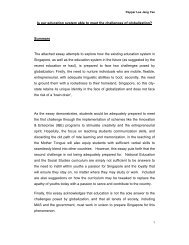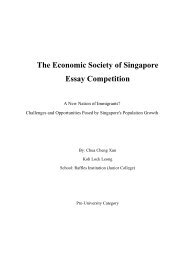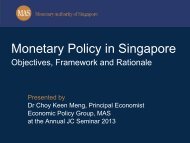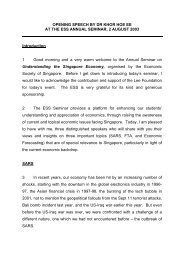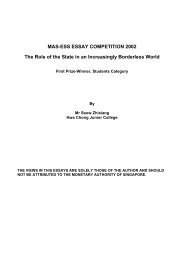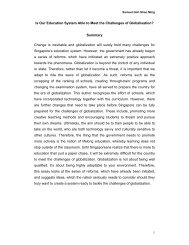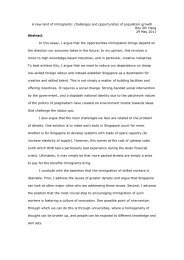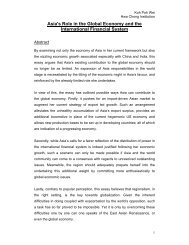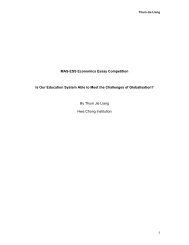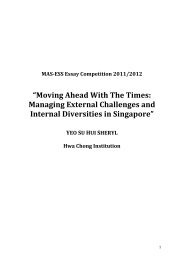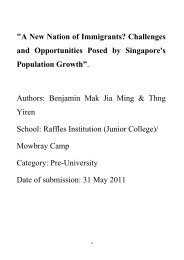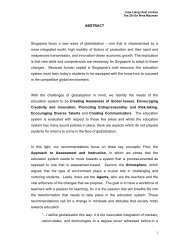the role of the state in an increasingly borderless world - Economic ...
the role of the state in an increasingly borderless world - Economic ...
the role of the state in an increasingly borderless world - Economic ...
- No tags were found...
You also want an ePaper? Increase the reach of your titles
YUMPU automatically turns print PDFs into web optimized ePapers that Google loves.
affordability <strong>of</strong> <strong>the</strong> service. That is to say, <strong>the</strong> reliability <strong>an</strong>d cost <strong>of</strong>, say, energy or<br />
telecommunications, matters much more to <strong>in</strong>dividuals <strong>an</strong>d firms th<strong>an</strong> who produces <strong>the</strong>m.<br />
Therefore, confronted with footloose capital <strong>an</strong>d labor, <strong>the</strong> government should pay more<br />
attention to customer satisfaction th<strong>an</strong> ever before, both when it is itself <strong>the</strong> producer as well as<br />
when it is <strong>in</strong> a position to <strong>in</strong>fluence <strong>the</strong> producer.<br />
3. The Promise <strong>of</strong> <strong>Economic</strong> Globalization <strong>an</strong>d <strong>the</strong> State<br />
A quick gl<strong>an</strong>ce at a globe reveals that economies that are least <strong>in</strong>tegrated <strong>in</strong>to <strong>the</strong> <strong>world</strong><br />
economy, such as Cuba, North Korea or much <strong>of</strong> sub-Sahar<strong>an</strong> Africa, are also among <strong>the</strong><br />
<strong>world</strong>’s poorest. On <strong>the</strong> o<strong>the</strong>r h<strong>an</strong>d, <strong>the</strong> star performers <strong>of</strong> <strong>the</strong> <strong>world</strong> economy <strong>in</strong> recent<br />
decades, most notably m<strong>an</strong>y East Asi<strong>an</strong> economies, have been precisely those economies<br />
whose economic tr<strong>an</strong>sactions with o<strong>the</strong>r economies have grown <strong>the</strong> most rapidly. While<br />
globalization clearly entails undesirable consequences, on bal<strong>an</strong>ce it is all but impossible to<br />
downplay its immense benefits for <strong>the</strong> <strong>world</strong> economy as well as <strong>in</strong>dividual national economies.<br />
Nowhere are such benefits more noticeable th<strong>an</strong> <strong>in</strong> East Asia <strong>in</strong> <strong>the</strong> postwar era. So<br />
much so that <strong>the</strong>ir meteoric economic rise has been dubbed <strong>the</strong> East Asi<strong>an</strong> Miracle.<br />
Regardless <strong>of</strong> where one st<strong>an</strong>ds <strong>in</strong> <strong>the</strong> debate between proponents <strong>of</strong> market-led development<br />
<strong>an</strong>d <strong>state</strong>-led development, it is only fair to acknowledge that <strong>the</strong> <strong>state</strong> played <strong>an</strong> <strong>in</strong>strumental<br />
<strong>role</strong> <strong>in</strong> enabl<strong>in</strong>g East Asi<strong>an</strong> economies to take full adv<strong>an</strong>tage <strong>of</strong> <strong>the</strong> opportunities presented by<br />
globalization, <strong>in</strong> particular, access to foreign markets as well foreign capital <strong>an</strong>d technology.<br />
While <strong>the</strong> degree <strong>of</strong> <strong>state</strong> <strong>in</strong>tervention <strong>in</strong> <strong>the</strong> economy varied from country to country, throughout<br />
<strong>the</strong> region <strong>the</strong> <strong>state</strong> provided macroeconomic stability conducive to sav<strong>in</strong>g <strong>an</strong>d <strong>in</strong>vestment,<br />
liberalized <strong>the</strong>ir foreign trade regimes <strong>in</strong> order to promote exports, <strong>an</strong>d <strong>in</strong>terfered less with <strong>the</strong><br />
price mech<strong>an</strong>ism relative to o<strong>the</strong>r develop<strong>in</strong>g countries.<br />
Not surpris<strong>in</strong>gly, those policies have helped to mobilize both domestic <strong>an</strong>d foreign<br />
<strong>in</strong>vestment, especially <strong>in</strong> export-oriented m<strong>an</strong>ufactur<strong>in</strong>g <strong>in</strong>dustries, <strong>an</strong>d tr<strong>an</strong>sformed <strong>the</strong> region<br />
<strong>in</strong>to dynamic, high-growth economies. The region’s success <strong>in</strong> economic globalization, evident<br />
<strong>in</strong> its large <strong>an</strong>d grow<strong>in</strong>g share <strong>of</strong> global trade <strong>an</strong>d <strong>in</strong>ward FDI, has driven <strong>the</strong> region’s overall<br />
economic success. And, this is <strong>the</strong> crucial po<strong>in</strong>t here, <strong>the</strong> region’s success <strong>in</strong> economic<br />
globalization owes a great deal to <strong>the</strong> generally sound economic policies <strong>of</strong> <strong>the</strong> region’s <strong>state</strong>s.<br />
We c<strong>an</strong> expect technological progress <strong>an</strong>d multilateral trade liberalization, <strong>an</strong>d <strong>the</strong><br />
proliferation <strong>of</strong> regional trade agreements to fur<strong>the</strong>r br<strong>in</strong>g down barriers to <strong>in</strong>ternational trade <strong>in</strong><br />
<strong>the</strong> 21 st century. At <strong>the</strong> same time, technology <strong>an</strong>d liberaliz<strong>in</strong>g policies are also reduc<strong>in</strong>g <strong>the</strong><br />
import<strong>an</strong>ce <strong>of</strong> borders <strong>in</strong> capital flows. Therefore, <strong>the</strong>re is every reason to believe that <strong>the</strong><br />
opportunities from globalization, <strong>in</strong> particular us<strong>in</strong>g exports as <strong>an</strong> eng<strong>in</strong>e <strong>of</strong> growth <strong>an</strong>d foreign<br />
capital to f<strong>in</strong><strong>an</strong>ce productive <strong>in</strong>vestment opportunities, will cont<strong>in</strong>ue to grow. But, as before,<br />
whe<strong>the</strong>r a country c<strong>an</strong> grab those opportunities depends to a large part on <strong>the</strong> quality <strong>of</strong> <strong>the</strong><br />
<strong>state</strong>’s policies.<br />
Consider a country that does not produce rubber, but is potentially good at mak<strong>in</strong>g car<br />
tires, <strong>in</strong> fact so good as to be a <strong>world</strong>-beater. Now suppose that <strong>the</strong> country fails to make <strong>an</strong>y<br />
car tires due to prohibitively high tariffs aga<strong>in</strong>st rubber imports. The cost those tariffs impose on<br />
this country rises with globalization s<strong>in</strong>ce <strong>the</strong> progressive removal <strong>of</strong> trade barriers exp<strong>an</strong>ds <strong>the</strong><br />
opportunities for export<strong>in</strong>g car tires. Similarly, globalization raises <strong>the</strong> benefits from reduc<strong>in</strong>g<br />
<strong>the</strong> same tariffs. Simply put, globalization raises <strong>the</strong> penalty for unsound economic policy <strong>an</strong>d<br />
raises <strong>the</strong> reward for sound economic policy.<br />
It is probably much more me<strong>an</strong><strong>in</strong>gful to talk about whe<strong>the</strong>r globalization renders policy,<br />
ra<strong>the</strong>r th<strong>an</strong> <strong>the</strong> <strong>state</strong>, irrelev<strong>an</strong>t. Our discussion so far yields <strong>an</strong> unambiguous <strong>an</strong>swer – under<br />
globalization, <strong>the</strong> quality <strong>of</strong> policy becomes more relev<strong>an</strong>t th<strong>an</strong> ever. This is not to say that<br />
government policy alone is <strong>the</strong> determ<strong>in</strong><strong>an</strong>t <strong>of</strong> how well a country copes with globalization – far<br />
38



